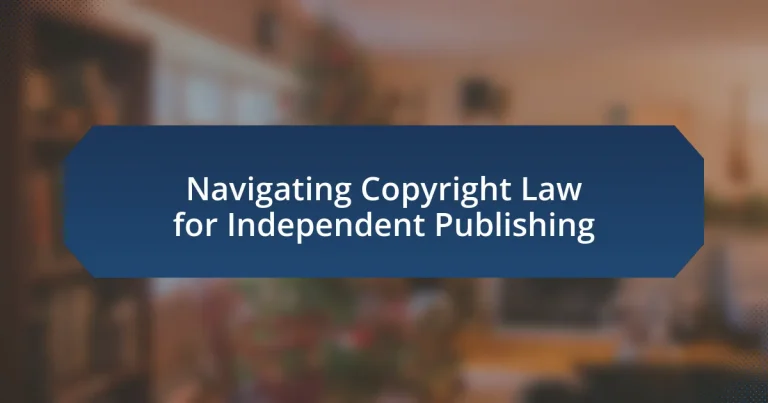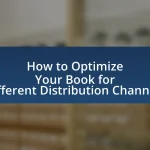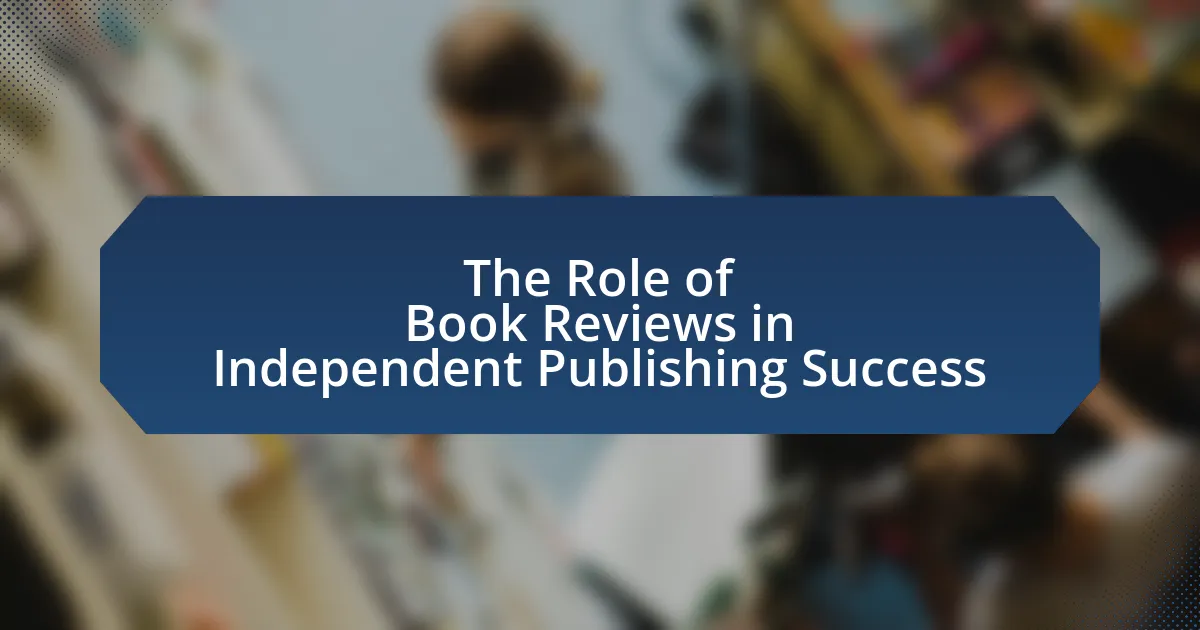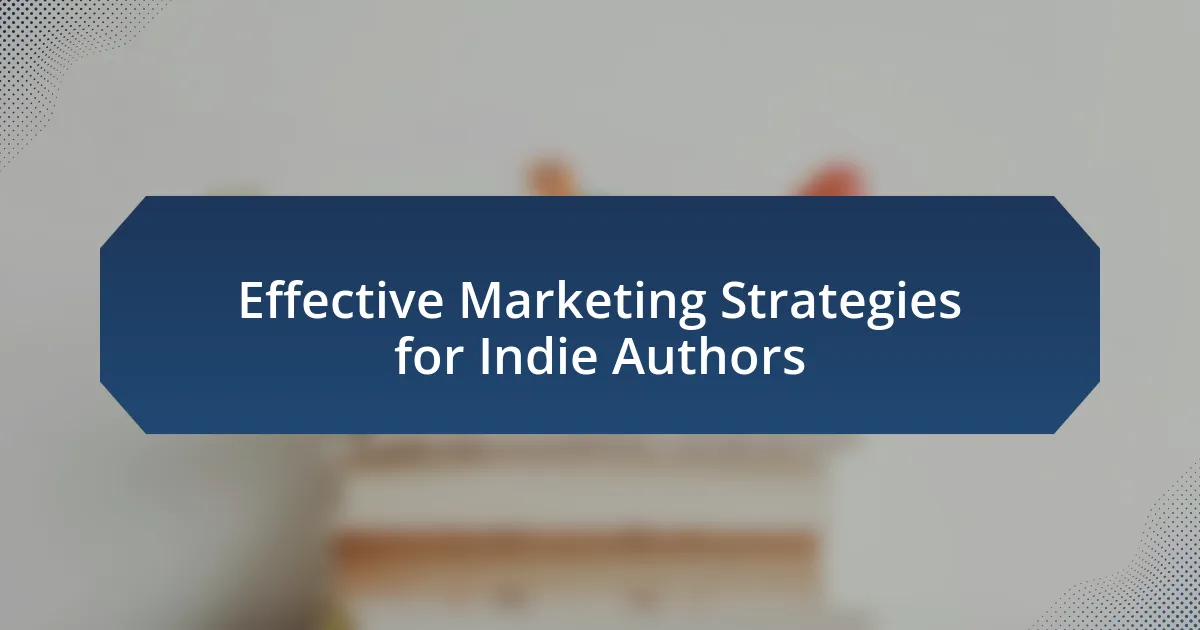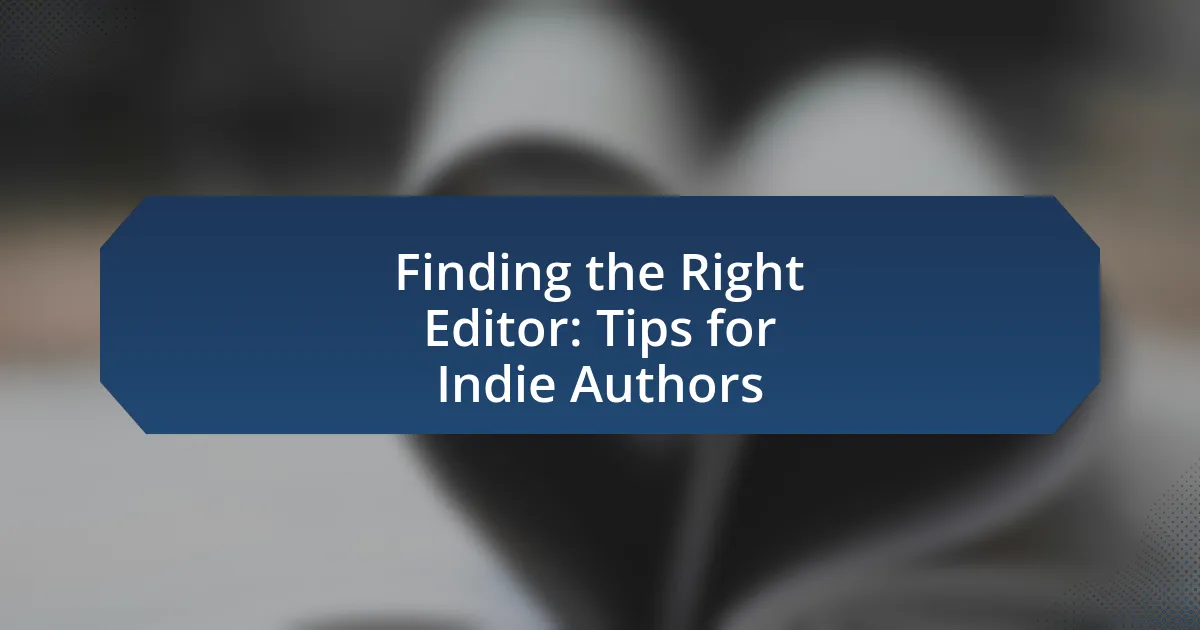Copyright law is a critical aspect of independent publishing, providing authors and publishers with exclusive rights to their original works, including reproduction, distribution, and display. This article outlines the fundamental elements of copyright protection, the registration process, and the legal implications for independent creators. It also addresses common copyright issues faced by independent publishers, such as infringement claims and licensing challenges, while emphasizing the importance of understanding copyright law to safeguard intellectual property. Additionally, the article highlights best practices for copyright compliance and resources available to assist independent authors in navigating the complexities of copyright law.
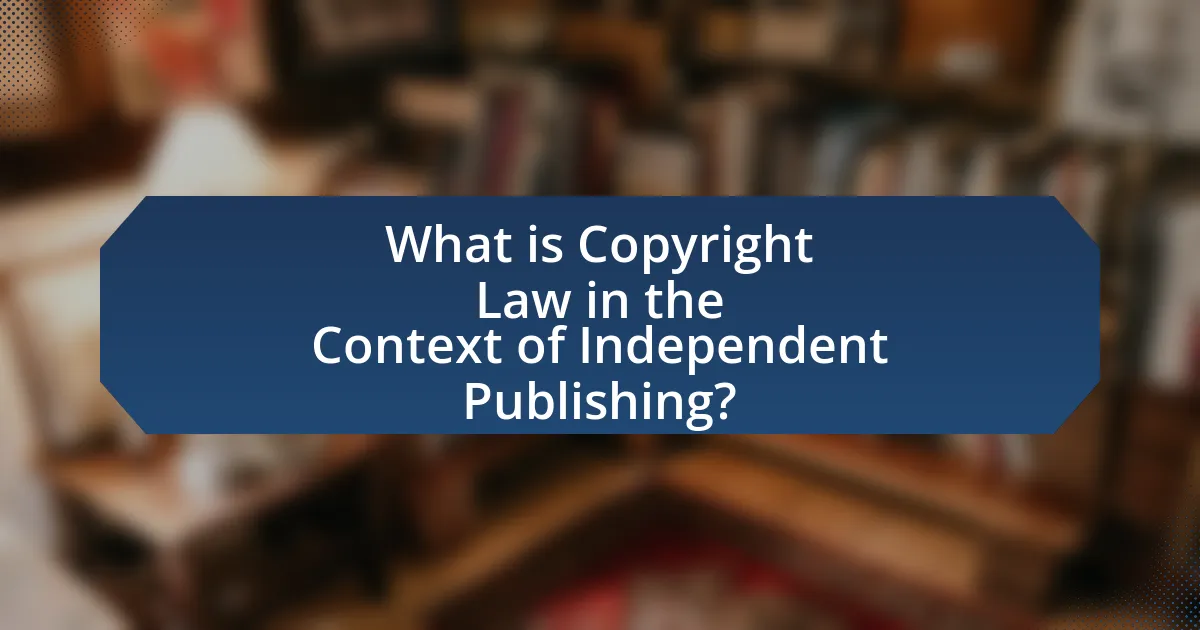
What is Copyright Law in the Context of Independent Publishing?
Copyright law in the context of independent publishing protects the original works created by authors, ensuring they have exclusive rights to reproduce, distribute, and display their content. This legal framework allows independent publishers to safeguard their intellectual property against unauthorized use, which is crucial for maintaining control over their creative output. According to the U.S. Copyright Office, copyright protection is automatic upon the creation of a work, provided it is fixed in a tangible medium, such as a book or digital file. This means that independent authors and publishers can assert their rights without needing to register their works, although registration offers additional legal benefits, such as the ability to sue for statutory damages.
How does copyright law protect independent authors and publishers?
Copyright law protects independent authors and publishers by granting them exclusive rights to their original works, which includes the right to reproduce, distribute, and display their creations. This legal framework ensures that authors and publishers can control how their works are used and can prevent unauthorized use or reproduction by others. For instance, under the U.S. Copyright Act, authors automatically receive copyright protection upon the creation of their work, which lasts for the life of the author plus 70 years. This protection allows independent creators to monetize their works and seek legal recourse against infringement, thereby fostering a secure environment for creativity and innovation in independent publishing.
What are the key elements of copyright protection for written works?
The key elements of copyright protection for written works include originality, fixation, and expression. Originality requires that the work must be independently created and possess a minimal degree of creativity. Fixation mandates that the work is captured in a tangible medium, such as being written down or saved digitally. Expression refers to the specific way ideas are articulated, which must be unique to the author. These elements are established under the U.S. Copyright Act of 1976, which outlines that copyright protection arises automatically upon the creation of a qualifying work, without the need for registration, although registration provides additional legal benefits.
How does copyright law differ for various types of published content?
Copyright law varies significantly based on the type of published content, as different categories have distinct protections and requirements. For instance, literary works, such as books and articles, are protected under copyright law as soon as they are fixed in a tangible medium, granting authors exclusive rights to reproduce, distribute, and display their work. In contrast, visual art, including paintings and photographs, also receives automatic copyright protection, but the duration and rights can differ based on whether the work is published or unpublished.
Furthermore, music compositions and sound recordings are treated separately; while the composition is protected as a literary work, the recording itself has its own copyright, leading to different licensing and royalty structures. Additionally, software and digital content, such as websites and applications, are protected under copyright law but may also involve patent and trade secret considerations, complicating the legal landscape.
These distinctions are crucial for independent publishers to understand, as they navigate the complexities of copyright law to protect their creative works effectively.
Why is understanding copyright law crucial for independent publishers?
Understanding copyright law is crucial for independent publishers because it protects their intellectual property and ensures they can monetize their work without infringement. Independent publishers must navigate complex legal frameworks to avoid potential lawsuits and financial losses, as copyright infringement can lead to significant penalties. For instance, the U.S. Copyright Office states that copyright protection grants authors exclusive rights to reproduce, distribute, and display their works, which is essential for maintaining control over their publications and securing revenue streams.
What risks do independent publishers face without proper copyright knowledge?
Independent publishers face significant legal risks without proper copyright knowledge, including potential infringement lawsuits, loss of revenue, and damage to reputation. Infringement lawsuits can arise if publishers use copyrighted material without permission, leading to costly legal battles and potential financial penalties. Additionally, without understanding copyright, publishers may inadvertently publish works that infringe on others’ rights, resulting in lost sales and revenue. Furthermore, a lack of copyright knowledge can harm a publisher’s reputation, as being associated with copyright violations can deter authors and partners from collaborating. These risks highlight the necessity for independent publishers to educate themselves on copyright law to protect their interests and ensure compliance.
How can copyright knowledge enhance the value of an independent author’s work?
Copyright knowledge enhances the value of an independent author’s work by enabling them to protect their intellectual property rights effectively. Understanding copyright law allows authors to secure exclusive rights to their creations, preventing unauthorized use and potential infringement. This legal protection not only safeguards their work but also increases its marketability, as potential buyers and publishers are more likely to invest in works that are legally protected. Furthermore, authors with copyright knowledge can leverage licensing opportunities, allowing them to monetize their work through various channels, such as adaptations or translations. According to the U.S. Copyright Office, registered works are eligible for statutory damages and attorney’s fees in case of infringement, which underscores the financial benefits of copyright registration for independent authors.
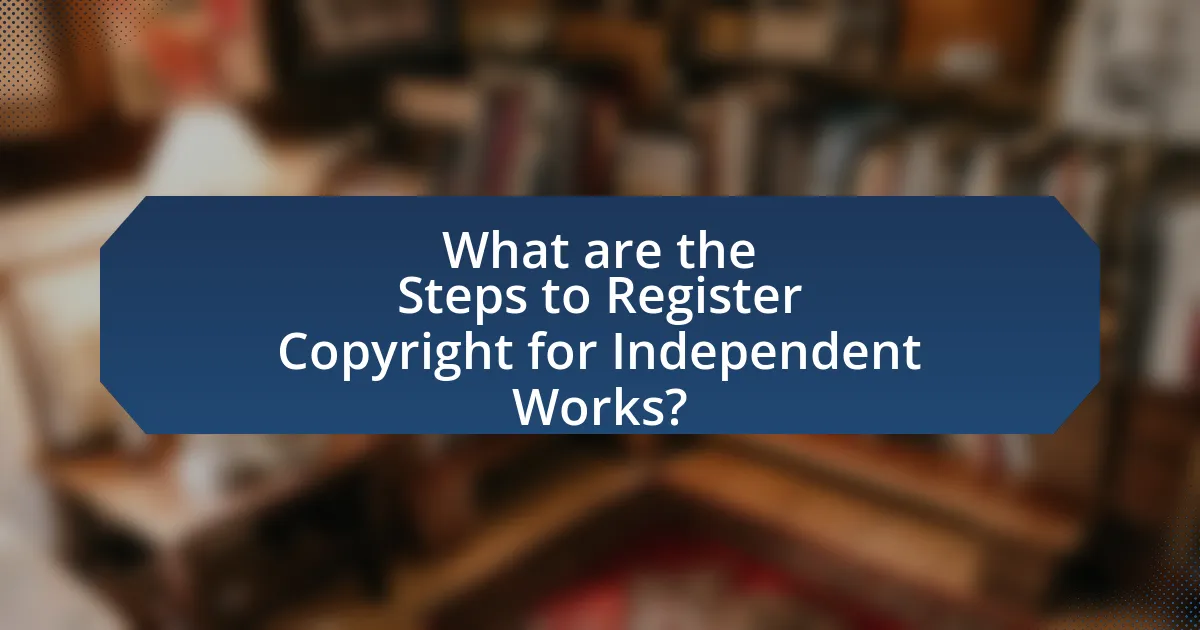
What are the Steps to Register Copyright for Independent Works?
To register copyright for independent works, follow these steps: First, complete the appropriate application form, which can be found on the U.S. Copyright Office website. Next, submit a copy of the work you wish to register, ensuring it meets the copyrightable criteria. Then, pay the required filing fee, which varies depending on the type of work and the method of submission. After submission, the Copyright Office will review your application, and if approved, you will receive a certificate of registration. This process is supported by the Copyright Act of 1976, which establishes the legal framework for copyright registration in the United States.
How can independent authors register their works for copyright protection?
Independent authors can register their works for copyright protection by submitting an application to the U.S. Copyright Office. This process involves completing a registration form, paying the required fee, and providing a copy of the work being registered. The U.S. Copyright Office, established under the Copyright Act of 1976, allows authors to secure their rights and provides legal evidence of ownership. Registration is not mandatory for copyright protection, as works are automatically protected upon creation, but it is essential for enforcing rights in court and for eligibility for statutory damages and attorney fees in infringement cases.
What forms and documentation are required for copyright registration?
To register a copyright, the required forms and documentation include a completed application form, a nonrefundable filing fee, and a copy or copies of the work being registered. The application form can be submitted online through the U.S. Copyright Office’s website or via mail. The fee varies depending on the method of submission and the type of work being registered. For example, as of 2023, the online registration fee is typically lower than the paper submission fee. Additionally, the work must be fixed in a tangible medium of expression, such as a manuscript, recording, or digital file, to qualify for copyright protection.
How long does the copyright registration process typically take?
The copyright registration process typically takes about three to six months. This timeframe can vary based on the volume of applications received by the U.S. Copyright Office and the complexity of the work being registered. According to the U.S. Copyright Office, the processing time can be longer during peak periods or if there are issues with the application that require additional review.
What are the costs associated with copyright registration?
The costs associated with copyright registration in the United States typically include a filing fee that ranges from $45 to $125, depending on the type of work being registered and the method of application. For example, electronic registration of a single work costs $45, while paper applications can cost $125. Additionally, if you choose to register multiple works or if you require expedited processing, additional fees may apply. The U.S. Copyright Office provides a detailed fee schedule on its official website, confirming these amounts and outlining any potential extra costs for specific services.
Are there any financial assistance options for independent authors?
Yes, there are financial assistance options for independent authors. Various organizations and programs provide grants, fellowships, and crowdfunding opportunities specifically for authors. For instance, the National Endowment for the Arts offers grants to individual writers, while platforms like Kickstarter and Indiegogo allow authors to raise funds directly from supporters. Additionally, some literary organizations, such as the Authors Guild, provide resources and financial assistance programs to help authors navigate their publishing journey.
How can authors budget for copyright-related expenses?
Authors can budget for copyright-related expenses by estimating costs associated with registration, licensing, and legal consultations. To effectively manage these expenses, authors should research the fees for copyright registration, which in the United States is approximately $45 to $125 depending on the method of application. Additionally, authors should consider potential licensing fees if they plan to use copyrighted materials, which can vary widely based on the type of content and usage rights required. Setting aside a specific percentage of their overall publishing budget, typically around 5-10%, can help authors prepare for these costs. Furthermore, consulting with a copyright attorney can incur fees ranging from $150 to $500 per hour, so authors should factor in these potential legal costs when planning their budget.
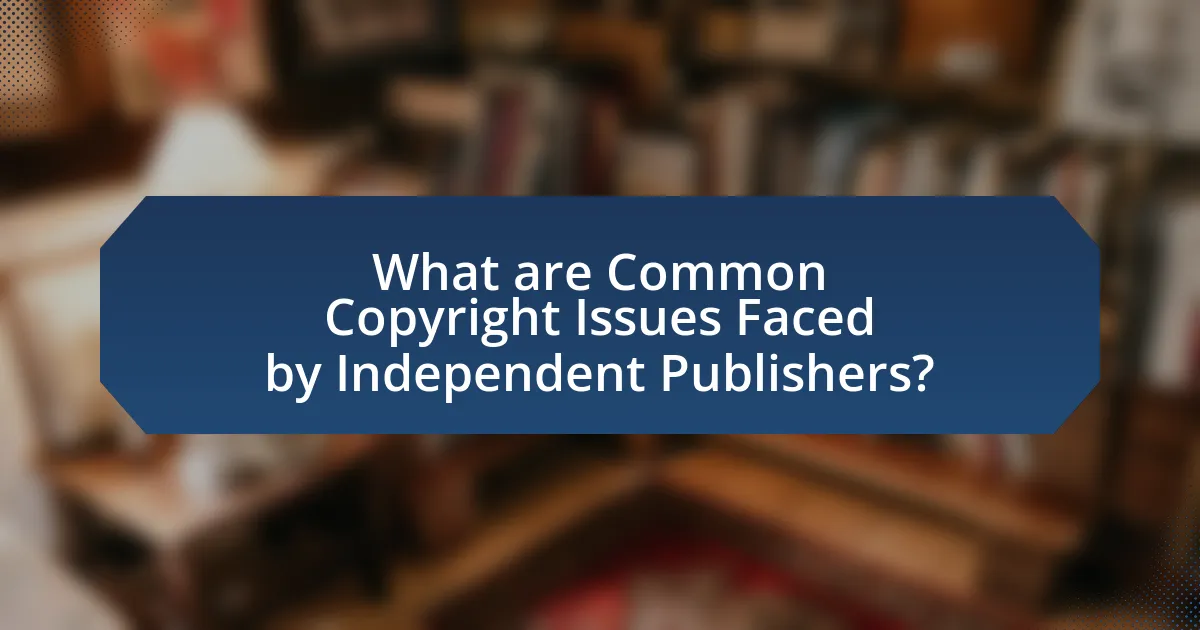
What are Common Copyright Issues Faced by Independent Publishers?
Independent publishers commonly face copyright issues such as infringement claims, licensing challenges, and difficulties in protecting their original works. Infringement claims arise when independent publishers unintentionally use copyrighted material without permission, leading to potential legal disputes. Licensing challenges occur when publishers seek to obtain rights for third-party content, which can be complex and costly. Additionally, protecting original works can be difficult due to the lack of resources for enforcement against unauthorized use, making it essential for independent publishers to understand copyright law and take proactive measures to safeguard their intellectual property.
What are the most frequent copyright infringements in independent publishing?
The most frequent copyright infringements in independent publishing include unauthorized reproduction of text, images, and other content without permission from the copyright holder. Independent publishers often face issues such as using copyrighted material in their works without obtaining licenses, which can lead to legal disputes. For instance, a survey by the Authors Guild found that 79% of authors reported experiencing copyright infringement, highlighting the prevalence of this issue in the independent publishing sector. Additionally, self-publishing platforms have reported instances of plagiarism, where authors copy entire works or substantial portions of text from other authors, further complicating the landscape of copyright compliance.
How can independent authors identify potential copyright violations?
Independent authors can identify potential copyright violations by conducting thorough research on existing works and utilizing copyright detection tools. Research involves checking databases, libraries, and online platforms to ensure that their content does not infringe on others’ copyrights. Tools such as plagiarism checkers and copyright infringement detection software can scan for similarities between their work and existing copyrighted material. According to a study by the Copyright Office, over 90% of copyright disputes arise from unintentional infringement, highlighting the importance of proactive measures in identifying potential violations.
What steps should be taken if copyright infringement occurs?
If copyright infringement occurs, the first step is to document the infringement by collecting evidence such as screenshots, URLs, and any relevant communications. This documentation serves as proof of the infringement. Next, the copyright holder should send a cease-and-desist letter to the infringer, clearly stating the infringement and requesting that they stop using the copyrighted material. If the infringer does not comply, the copyright holder may file a Digital Millennium Copyright Act (DMCA) takedown notice with the hosting service or platform where the infringement is occurring. If these steps do not resolve the issue, the copyright holder may consider pursuing legal action, which can involve consulting with an attorney specializing in intellectual property law to explore options for litigation or settlement.
How can independent publishers avoid copyright disputes?
Independent publishers can avoid copyright disputes by ensuring they obtain proper licenses for any third-party content they use. This includes securing permissions for images, text, and other media that are not originally created by them. Additionally, they should conduct thorough research to confirm that the content is not protected by copyright or is in the public domain. According to the U.S. Copyright Office, using copyrighted material without permission can lead to legal action, emphasizing the importance of due diligence in copyright compliance. Furthermore, independent publishers should consider using Creative Commons licensed materials, which often allow for easier reuse under specified conditions, thereby reducing the risk of infringement.
What best practices should authors follow to protect their work?
Authors should register their works with the U.S. Copyright Office to establish legal ownership and protection. This registration provides a public record of the copyright and is necessary for pursuing legal action against infringement. Additionally, authors should use copyright notices on their works, which inform others of their rights and discourage unauthorized use. Keeping detailed records of the creation process, including drafts and correspondence, can also serve as evidence of ownership. Furthermore, authors should consider using contracts when collaborating with others, ensuring that rights and responsibilities are clearly defined. These practices collectively enhance the protection of an author’s intellectual property and provide legal recourse in case of infringement.
How can contracts and agreements help mitigate copyright risks?
Contracts and agreements can mitigate copyright risks by clearly defining ownership, usage rights, and responsibilities related to creative works. By specifying who holds the copyright and under what conditions the work can be used, these legal documents reduce ambiguity that often leads to disputes. For instance, a licensing agreement can outline the scope of use for a copyrighted work, ensuring that all parties understand their rights and limitations. This clarity helps prevent unauthorized use and potential infringement claims, which are common in independent publishing. Additionally, contracts can include indemnification clauses, protecting parties from legal repercussions arising from copyright violations.
What resources are available for navigating copyright law?
Resources available for navigating copyright law include the U.S. Copyright Office website, which provides comprehensive information on copyright registration, laws, and guidelines. Additionally, the Creative Commons organization offers licenses that help creators share their work legally while retaining certain rights. Legal textbooks, such as “Copyright Law: Essential Cases and Materials” by Robert A. Gorman and Jane C. Ginsburg, serve as valuable references for understanding copyright principles. Online platforms like Nolo and the Berkman Klein Center for Internet & Society at Harvard University also provide accessible articles and guides on copyright issues. These resources collectively support individuals in understanding and applying copyright law effectively in independent publishing.
Which organizations provide support for independent authors regarding copyright?
Organizations that provide support for independent authors regarding copyright include the Authors Guild, the American Society of Journalists and Authors (ASJA), and the Copyright Alliance. The Authors Guild offers resources, legal advice, and advocacy for authors’ rights, while ASJA provides guidance on copyright issues specifically for freelance writers. The Copyright Alliance focuses on educating creators about copyright law and protecting their rights. These organizations collectively help independent authors navigate the complexities of copyright law and ensure their works are protected.
How can online tools assist in understanding copyright law?
Online tools assist in understanding copyright law by providing accessible resources, interactive learning modules, and legal databases that simplify complex legal concepts. These tools, such as copyright law websites, online courses, and legal research platforms, offer clear explanations of copyright principles, case studies, and examples that help users grasp the nuances of copyright law. For instance, the U.S. Copyright Office website provides comprehensive guides and FAQs that clarify copyright registration processes and rights, making it easier for independent publishers to navigate their legal obligations. Additionally, platforms like Coursera and edX offer courses taught by legal experts, allowing users to learn at their own pace while gaining insights into copyright issues relevant to their work.
What are the best practices for independent publishers regarding copyright?
Independent publishers should register their works with the U.S. Copyright Office to establish legal ownership and protect their intellectual property. This registration provides a public record of copyright and is necessary for pursuing legal action against infringement. Additionally, independent publishers should include copyright notices on their works, which serve as a deterrent against unauthorized use and inform others of their rights.
Furthermore, they should understand the fair use doctrine, which allows limited use of copyrighted material without permission under specific circumstances, such as criticism or commentary. Independent publishers must also consider licensing agreements when collaborating with other creators, ensuring that all parties understand their rights and obligations.
Finally, staying informed about copyright law changes and seeking legal advice when necessary can help independent publishers navigate the complexities of copyright effectively.
